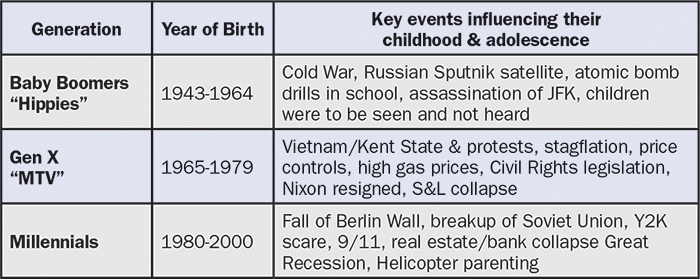“The younger generation doesn’t have the same work ethic as I do. And they want to keep changing jobs. They’re a challenge to hire and manage!”
We frequently hear this from dealership managers, who also complain that the so-called Millennials spend too much time Tweeting, on Facebook or doing other things that don’t appear relevant to their job.
On the other hand, those same managers admit the employees they hire are more comfortable with technology, with change and with networking to find answers or solutions.
Although dealership managers are Baby Boomers or Gen Xer’s, Millenials are now beginning to move into management positions where they find it challenging to connect with and coach employees of older generations.
In this article we’ll provide some perspectives about the differences between generations that may help you turn these apparent challenges into opportunities.
Generations Defined
First about the generation names:
- Baby Boomers: Born into the “boom” in both birthrates and the economy after World War II.
- Generation X: Comes from X as an unknown and used to describe a generation that has less distinct characteristics and more unknowns in their prospects than the Boomers.
- Millennials: Those whose formative years occurred around the year 2000 (the Millennium).
Other generational definitions are the GI Generation born between 1901-1935, many of whom fought in WWI, the Silent Generation born between 1925-1942, and Generation Z born after 2000.
What Drives Millenials?
This generation has seen a tremendous amount of change, much of which has negatively affected their parents, family and society. They saw many people in management positions, as well as blue-collar workers, lose their jobs during the Great Recession, they experienced the national and individual trauma of September 11th, and the wars and aftermath of Iraq and Afghanistan.
These negative effects are not necessarily the fault of individuals. During their early years, Millennials saw that even if they work hard, their personal circumstances might change despite their work ethic and skills.
This uncertainty about their own ability to succeed means that this generation does not want to depend on others for their opportunity to succeed — they want to be more in control of their own future. This can help explain why they want to experience new jobs. They are experimenting with and building a toolbox of experiences and skills in case their circumstances change unexpectedly.
It may also explain why they have stricter boundaries between their work and personal lives. They work hard while at work, but they don’t feel compelled to spend extra time at the office. This is unlike older generations who feel that their hard and extra work will be repaid somehow.
The other driver of Millennials is how they were raised. Their mostly Gen X parents spent a lot of time helping them grow and succeed — often to excess, i.e., ‘Helicopter Parenting.’ The result in many cases is that Millennials who are new managers, while good at collaborating and cooperating, are not as capable of organizing their own work because structure in their lives had been provided by their parents.
While these are stereotypes that are broad descriptions, it should be noted that there is as much variation of individuals within a generation as between them. There are Millennials who work overtime as well as those who know how to organize work and deliver results.
What are the Opportunities?
- Sell your dealership brand: Millennials prefer to work in a smaller company where they are better able to control their future.
- First impressions count: If you don’t make a splash online, Millennials will find an employer who does.
- Leverage their networks: As masters of their own mindset and future, Millennials will amplify the positives of your dealership and help recruit others.
- Give them structure and vision: What attracts them is structure and planning and forethought by the company they work for.
- Challenge them to help you grow: Technologically savvy Millennials are more risk-taking in their careers and expect results quickly.
Each of these characteristics are exactly what you should want for your dealership!

|
|
Here are the descriptions of the different age groups with examples of the key events that happened during each generations’ early years that may help explain the stereotypical behaviors of each. |







